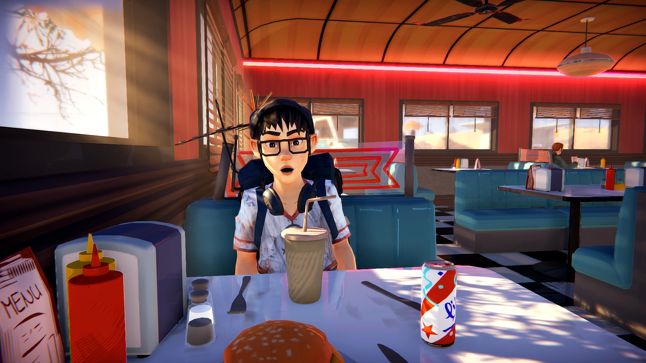It is somewhat poetic, Yoan Fanise tells us with a laugh, that his last game — 11-11 Memories Retold — is about an Allied soldier befriending and working with a German in the midst of World War I… and here he is, a French developer, taking his studio DigixArt into the fold of a German publisher, Koch Media.
The acquisition was one of eight announced by Embracer Group this morning, and sees DigixArt and its IP becoming fully owned by Koch in a deal worth well over $300 million (although the amount paid for each studio has not been disclosed).
Speaking to GamesIndustry.biz, co-founder Fanise said the studio began receiving a number of acquisition offers from around the world, including Chinese and Japanese publishers, after a trailer for its upcoming adventure game Road 96 was shown at December’s The Game Awards.

Yoan Fanise, DigixArt
DigixArt had been speaking to Koch at various points about a potential publishing deal for Road 96, but Fanise and his team eventually decided to self-publish. Nonetheless, Koch picked up the conversation earlier this year, also talking about the possibility of an acquisition.
Fanise tells us Koch was chosen “because we preferred the freedom and the maturity of the structure,” with freedom in particular being key to the appeal.
“For me, what was important was creative freedom,” he says. “If we have both the freedom of making the games we want to and have the financial stability that would let us grow the team and keep them… because as an indie, you often have to decrease the team between projects because you have no more money. It’s a big waste. The idea was if we wanted to be more sustainable and have sustainable growth on the team, we needed finance. This seemed like the best of both worlds: having creative freedom and financial stability.”
He adds: “We want to do big, creative new things. That’s very risky. So if we want to make sure we can try anything, it’s better to make sure we have the stability behind us. So we could keep the team, we could even make two projects at once — what I would like to do is have one project in production and one in conception. That way one team is finishing a game while the other is prototyping new things, and with two lanes of production we could keep the whole team all along.”
Ownership at Koch apparently comes with other freedoms, such as how to release your game. Fanise reports it’s very much an “a la carte” scenario based on the needs of each game. While Road 96 is being supported by Koch’s Ravenscourt label, DigixArt has the option of the publisher’s other divisions, such as Deep Silver, or even self-publishing.
“This seemed like the best of both worlds: having creative freedom and financial stability”
The acquisition also comes at a fortuitous time; Road 96 is set to release on PC and Nintendo Switch in just over a week on August 16. Now with the power of a publisher behind them, the studio has more exposure and more marketing possibilities.
“Doing this before the launch enables us to amplify it,” Fanise explains. So we had this big launch [coming up], and now we have the power of Koch behind us.”
The enthusiasm Fanise expresses at the notion for the prospect of making two games at once shows he is already looking forward to future projects. With DigixArt now owned by a stable publisher, but retaining creative freedom, the team can potentially take on bigger concepts, ones they would not have been able to tackle as an indie.
“There are a lot of things we want to try,” says Fanise. “We like to try very impossible things, so next time we’re going to try something else. We have a lot of ideas for new features and gameplay systems. We want to try to merge more gameplay into narration because sometimes you have narrative on one side and then the gameplay on the other could be something like a minigame or a puzzle, but it’s hard to find something that really merges with the narration. We’re doing a lot of prototyping for ways to feel and experience the story in another way.
“We’re also looking into some kind of multiplayer component because people like to play together and narrative is really solo-driven. So one of the areas we have started to explore is a multiplayer narrative. That is something for the future… I don’t think that’s something that exists yet.”

Road 96 explores a journey to escape a troubled country from the point of view of not one, but many hitchhiking teenagers
Narrative will remain central to DigixArt projects going forward, as will exploring topics in ways that might not have been attempted in video games before. Fanise rose to prominence after his work on Valiant Hearts, the World War I game developed by Ubisoft Montpellier that ditched combat in favour exploring the trials and challenges soldiers on both sides of the conflict endured. 11-11: Memories Retold, similarly, is about relationships and understanding more than it is about the war.
Road 96, meanwhile — which we spoke to Fanise about earlier this year — is about teenagers attempting to escape a fictional regime by hitchhiking to the border, and the myriad events and misadventures that can occur along the way. While not based in the real world, the narrative aims to be no less serious, with Fanise adding that this is one of the many benefits of being an indie (albeit one that is technically no longer independent).
“I still see myself as an indie, at least in spirit. Even at Ubisoft, I thought of myself as an indie even though I was not”
“The good thing of being an indie is you can talk about politics or any topic without limitation,” he says. “AAA games and big companies always need to be in the middle and never get too political. I think it’s good for indies to use that freedom to be very unique and specific and stand out from the crowd, to say ‘No, we can talk about that.’
“What has me a bit worried sometimes is when you look at the movies, they talk about anything and nobody will say ‘Oh, this movie is political, boooo.’ I don’t understand why in the gaming world we criticise or make [a big deal] about being political or maybe talking about sex.’ Video games should be able to talk about anything — why not? I think there’s a bit of maturity that needs to arise in video games that’s not there yet. In these aspects, video games are a bit young and afraid of certain subjects — and it shouldn’t be.”
It’s interesting to hear him talk about tackling political subjects — Fanise also tells us he’s keen to explore the idea of documentary-style video games — given that a recent Facebook ad for Road 96 was initially flagged for being too political (due to phrases around reaching the border and escaping a troubled country). Fanise tells us the ad has since been approved by a Facebook employee, but he remains amused by the confusion his game caused for the social network’s algorithms.
“I was surprised when I received the notification, ‘Your video is refused,'” he says. “But in the end, when there was a human check, and the human said ‘Oh, no, this is okay, it’s a video game.’ So in the end it was approved, it’s not a big issue – it’s just funny that robots [did this].
“I was surprised that robots can recognise text in a video and decide whether it was political. There’s something threatening to that, that could be scary, but thankfully there was a human check after that.”
With DigixArt settling into its new home, the team is concentrating on the upcoming launch for Road 96, as well as whatever projects may follow. And Fanise, for one, is not about to let being owned by a publisher — which in turn is owned by an ever-growing group of publishers — change the way he works.
“I still see myself as an indie, at least in spirit,” he says. “Even when I was at Ubisoft, I thought of myself as an indie even though I was not. So for me, there’s no change in how we make games.”
GamesIndustry.biz
Source link
Related Post:
- New Koch label Prime Matter "won't shy away from risky or niche games"
- New Koch Media label will publish Payday 3 and a new Painkiller game
- Housemarque's Days of Making Smaller Titles Are Over After PlayStation Acquisition
- Support for Netflix has now ended on both Wii U and Nintendo 3DS
- Embracer Group has had acquisition talks with 150 more companies
- The Outer Worlds Has Surpassed 4 Million Sold-In Units
- Yoshi-P Reaffirms He's Still Working on Both Final Fantasy XIV and XVI
- Reminder: Miitopia and the blue Nintendo Switch Lite system both launch today
- The Great Ace Attorney Chronicles will feature both familiar and new gameplay mechanics
- Stranger Of Paradise Final Fantasy Origin Is Awesome Or Terrible. Possibly Both.
